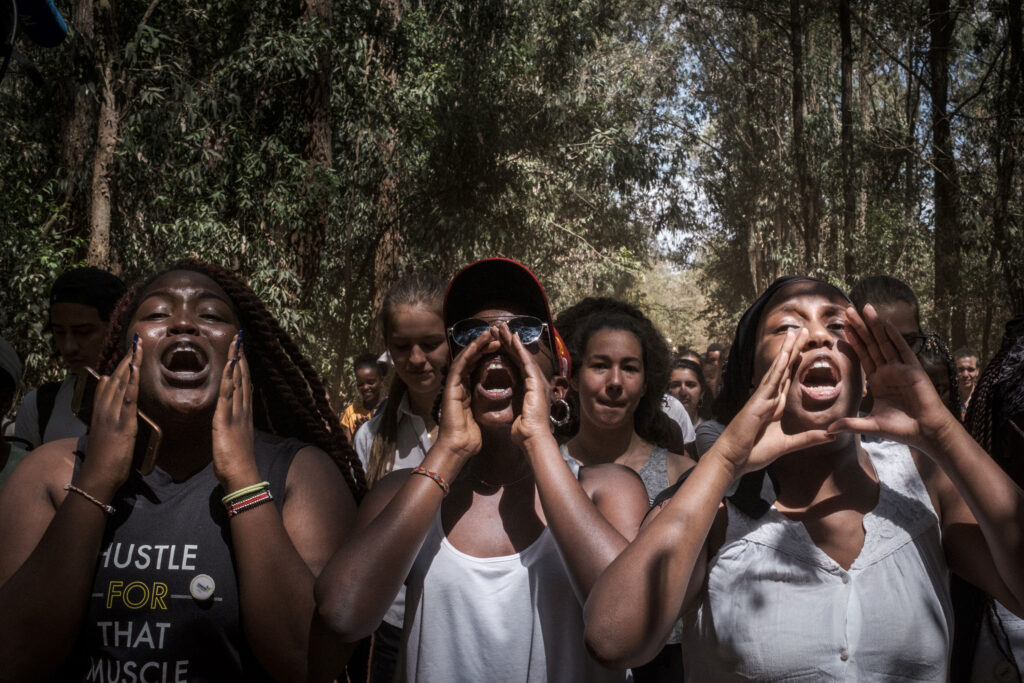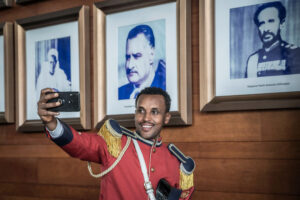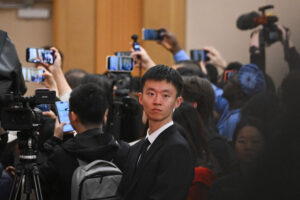Africa’s Moment

In 2022, Muhammadu Buhari, a former president of Nigeria, expressed his frustration with the West’s “hypocrisy” and “its inability to take responsibility” for the impact of climate change on African countries: They were left to suffer the consequences of the environmental damage that it was causing. Ethiopia joined the BRICS last year, moving toward the anti-American orbit of China and Russia. Today, South Africa is leading the vast legal battle against Israel’s war in Gaza. America and its allies keep losing credibility in Africa, and as they do, more external powers jostle for influence here.
Washington is trying to hold on. In May 2024, President Joe Biden hosted Kenyan President William Ruto, the first state visit to the United States by an African leader in sixteen years. Invoking what it called gross human rights violations, the US government had recently suspended Uganda, Gabon, Niger, and the Central African Republic from the 2000 African Growth and Opportunity Act, which grants select countries duty-free access to the US market. So much for one of its best tools to counter China’s campaign to win hearts and minds in Africa.
In late October, Emmanuel Macron, the French president, traveled to Morocco, after a hairy argument with the kingdom this summer over the status of the Western Sahara. Deals worth some $10 billion were signed, but this was largely an operation in damage limitation—and France has been losing its long-time military footholds in Niger and Mali, while Russian security forces have moved in.
There is no stopping the historic shifting of allegiances and power dynamics underway on the continent. For quite some years, China has been trying to secure critical raw resources and has been developing massive infrastructure through the Belt and Road Initiative, its attempt to re-engineer a modern-day Silk Road. Now it is trying to create new markets in Africa to sell its renewable energy and, to a smaller extent, its military technology. Since 2017 it also has operated a military base out of Djibouti, not far from much older French and US facilities.
Russia, already active in the Sahel and the Central African Republic, also wants a formal base and port of its own, on the Red Sea. This might explain why this summer it seemed to switch sides in the civil war in Sudan and is now consummately hedging there: Even as it officially backs the Sudan Armed Forces, it unofficially continues to back the SAF’s opponent, the Rapid Support Forces, through the Russian mercenary group Wagner.
Although Saudi Arabia and the United Arab Emirates are traditional allies, simmering tensions between their current leaders pit them, too, on either side of the civil war in Sudan.
Turkey, under President Recep Tayyip Erdogan, is nostalgic for the reach of the Ottoman Empire. It once focused on soft power, providing religious and spiritual direction to local sects—or more recently, mass entertainment via its public broadcaster TRT, which launched an Africa service in 2022. Today it is playing a more hard-nosed geopolitical game. Its trade with the continent has gone from $3 billion to $32 billion over the past two decades, and it has started supplying arms in various parts of the continent. The Nigerian government turned to the Turks for drones to deal with gangs in Zamfara State after being rebuked by the UK over human rights concerns. Turkey is supporting Somalia against Ethiopia in their heightened rivalry over a deal early this year in which Somaliland, a breakaway region of Somalia that seeks formal statehood, granted landlocked Ethiopia access to the Gulf of Aden through its territory. Turkey also wants a bite of the security cake in the Sahel.
In short, Africa is having a multipolar moment. But this is not its first—and that is just the challenge.
Some analysts argue that multipolarity will benefit African states by multiplying their options for new partnerships, economic or other, and by enhancing their leverage in fresh negotiations or in renegotiations with old partners. I have my doubts: This perspective overlooks several critical factors that complicate the underlying dynamics.
Increased bargaining power won’t automatically translate into better outcomes for African countries; in some cases, it is likely to intensify the negative legacy of both colonialism and neocolonialism. Many African states remain economically dependent on former colonial powers, and now they risk also becoming dependent on emerging players.
Nigeria, after economic crises, implemented reforms in the 1990s to satisfy International Monetary Fund and World Bank loan conditions, and those austerity measures—which aimed to reduce public spending, liberalize trade, devalue the currency—only contributed to the country’s economic collapse, greater poverty, and social unrest. Many Nigerians today feel that the country still has not recovered. In 2022, Ghana turned to the International Monetary Fund in the face of soaring inflation, high public debt, and a currency crisis. But the reforms it put in place in exchange for a $3 billion loan deepened social inequalities and fueled public dissatisfaction, with many, again, blaming the West.
In contrast, China’s substantial Belt and Road Initiative investments, which come free of stringent political conditions and are cast in what appear to be mutually beneficial terms, seem to offer immediate economic opportunities. Yet those often come with other conditions of their own, including some that create debt dependency and compromise sovereignty. At the end of 2019, Zambia’s commitments to its Chinese lenders alone amounted to close to 43 percent of gross national income. As of early this year, China was Kenya’s largest creditor, thanks to a $6 billion loan to finance a rail line between Nairobi and Mombasa. Among other concerns: the influx of Chinese labor and Chinese companies’ lack of adherence to local governance and environmental standards.
Competition among global powers might also intensify political fractures within some African countries, as well as between them. The scramble for influence could foster conflict rather than cooperation as different local factions align with different foreign forces—some of which export their own wars. In Mali in July, more than eighty government troops and mercenaries from the Wagner group were killed during an ambush by Tuareg separatists and a local Al-Qaeda affiliate, who reportedly acted on intelligence relayed by the Ukrainian authorities. Mali then cut diplomatic ties with Ukraine.
Mohamed Bazoum, a former president of Niger who was democratically elected, is ethnic Ouled, and while he was in power, in 2021–23, he supported maintaining a French security presence in the country despite growing anti-Western popular sentiment. He was overthrown in 2023 by the head of the presidential guard, Abdourahamane Tchiani, an ethnic Hausa, who then forced out the French troops and invited in Wagner forces. After the coup, President Bola Tinubu of Nigeria, an ethnic Yoruba who spent years in exile in the United States, threatened to invade Niger to restore democracy. But he faced huge opposition from ethnic Hausa Nigerians: Some vowed to prevent Nigerian troops from bringing violence to their kin in Niger by threatening to go to war with southern Nigeria, historically the same nation as that in large parts of modern-day Niger. It was yet more proof that Africa’s modern borders have only ever been lines drawn in the sand—quicksand.
Pre-colonial Africa had its own international system, shaped by its own patterns of trade and conquest across the continent. By the sixteenth century, the Fulani empires of Futa Jallon, Futa Toro, Masina, and Sokoto stretched from modern Senegal to modern Cameroon, and their interactions had established the foundations for expansive identities: in this case Muslim theocracies that adhered to Sharia law and Fulani ethnic supremacy. In southern Africa, the Zulu Kingdom conquered many neighboring tribes to create a nation based on its values of ubuntu, which stands for “I am what I am because of you,” as well as ancestor worship and respect for nature and strength.
European colonization disrupted these organic processes of development. The Treaty and Peace of Westphalia of 1648 ended wars in Europe, and by creating the modern nation-state, defined by territoriality and sovereignty, it established the contemporary international system. When the Berlin Conference of 1884–85 formalized European claims in Africa, it allowed artificial boundaries to be imposed there through violent conquest, disregarding existing relationships among Indigenous groups. The African countries that resulted were as internally diverse as they lacked cohesive national identities.
By the early twentieth century, nearly the entire continent had been colonized. Its territories were integrated into a global system that rewarded European political, economic, and social paradigms and that marginalized local governance structures and sociocultural systems—creating a volatile mix of identities within the new nation-states. Colonial rule in Africa was marked by economic exploitation, political repression, and cultural imposition. European powers established economies focused on exploiting and exporting African minerals, rubber, agricultural products, and other raw materials for use by European industries; never mind local development. Colonialism also reshaped African identities and social norms to facilitate resource extraction; it imposed European languages, religions, and educational systems at the expense of Indigenous cultures.
The effects remain pervasive today, including in very mundane ways. I am ethnic Igbo from Nigeria who speaks basic French; my partner is ethnic Yoruba from Nigeria who doesn’t know French. When we lived in Lagos, we once had a nanny for our kids from next-door Benin who spoke no English. While I struggled to communicate with her in broken French, my wife interacted with her to perfection, because she, too, could speak Yoruba, the language of their ancestors—from the vast Oyo Empire, which the Berlin Conference broke up into British, French, and German areas of influence well over a century ago.
In other words, even decolonization didn’t undo all that damage. During the Cold War, the continent was a battleground for superpower rivalries, which often exacerbated local conflicts. After the Soviet Union’s collapse in 1991, the international dimensions of many African disputes did diminish, allowing several nations—the Democratic Republic of the Congo, for example—to initiate peace processes and embark on rebuilding efforts (some of which then, of course, went tragically wrong). At the same time, the withdrawal of Cold War–era support from both sides exposed critical deficiencies in Africa. Many leaders lacked the insight and the political will necessary to adopt effective development strategies. Colonial disruptions to traditional structures of power had left many of them ill prepared for the large-scale governance challenges before them. And some, like Mengistu Haile Mariam of Ethiopia and Juvenal Habyarimana of Rwanda, had resorted to authoritarian practices, stifling the development of political institutions.
Nor did the end of the Cold War then completely eradicate external interference in African affairs; it only transformed it. Western powers continued to exert influence, through market incentives and reforms touted as promoting democracy. Some policies seemed incoherent. American- or Western-backed aid came with crippling conditions about governance reforms and human rights or terms that favored Western corporations over local development needs. And yet these players’ influence, with its structural adjustment programs and conditionality pegged to governance reforms or human rights, endured.
America and its allies have also backed some of the autocrats, such as Cameroon’s Paul Biya. In 1998, the Clinton Administration heralded an “African Renaissance” and blessed a cast of its supposed new leaders, including, most frequently, Isaias Afwerki, Meles Zenawi, Paul Kagame, and Yoweri Museveni, and sometimes also featuring Laurent Kabila. Whether it did this to secure cooperation for US counterterrorism efforts in the Horn of Africa, to atone for failing to stop the 1994 genocide in Rwanda or other reasons, when one looks back on those endorsements, they seem to also indict the US itself. Today, US support for operations against groups like al-Shabaab in Somalia or Boko Haram in Nigeria is both crucial and problematic.
Multipolarity now is different from multipolarity past. At the height of imperialism in the late nineteenth century, several European powers raced to carve up and claim swaths of Africa as their own, scrambling for its resources and strategic advantage. The collapse of the global order after World War I knocked Germany off the colonial table, but the economic turmoil of the interwar period set the stage for the rise of competing ideologies—fascism, communism, liberal democracy—each vying for dominance.
This period today also could be called—is—a multipolar moment. And beneath the surface of its shifting alliances still lies that concern both pressing and perennial: the fragility of Africa’s artificial borders. Somaliland wants independence; Ethiopia faces potential fragmentation. Multipolarity intensifies competition for influence and resources, and risks exacerbating internal divisions and rivalries. And that, in turn, may further strain the very fabric of African states.
But the continent is not simply a passive recipient of external influences; it actively engages with these powers, leveraging opportunities to address its development needs—only, it must navigate cautiously to avoid repeating historical patterns of exploitation and dependency.
African-led initiatives that seek to foster regional cooperation and economic integration have surged in recent years. Local actors—governments, civil society organizations, citizens—play a major role in shaping their future, and Africa’s. The African Continental Free Trade Area, which fosters regional cooperation and economic integration among forty-seven states, is a testament to local actors’ capacity to assert their agency. The Gacaca court system in Rwanda helped to heal the wounds of the 1994 genocide, complementing the work of the International Criminal Tribunal in Arusha; might a similar system help overcome the ethnic rifts that were forged during colonial times? Some politicians have skillfully navigated intricate geopolitical realities, including those of this new multipolar moment, to forge beneficial partnerships. President William Ruto of Kenya has engaged both Washington and Beijing: Kenya, a major ally of the US, also seeks membership in the BRICS.
China’s increasing political and economic engagement in global frameworks such as the African Union is transforming Africa’s diplomatic and economic positioning on the world stage, as well as amplifying the continent’s voice by supporting its positions in global forums. Beijing’s emphasis on development through state-led initiatives is a compelling alternative to the traditional Western paradigm, which prioritized market reform and political liberalization. Many local elites find the Chinese model appealing, particularly for its principle of noninterference in domestic politics. So, too, the influx of cheap, accessible Chinese goods. In some polls conducted in Mali in 2021, Russia had a favorable rating of 84 percent.
When Africa was still under colonial rule, or postcolonial and neocolonial reiterations, it remained largely a pawn in others’ global contest. Today, African countries have more agency, and they can prioritize their interests and aspirations. The real challenge for them is brokering common positions within their own geographical entities. During elections politicians tend to receive massive votes from their ethnic strongholds; the few who cross ethnic lines often spur anger among their kin.
As Western influence in Africa erodes, in some countries its appeal and that of democracy wanes. But another kind of social contract may be in order. However unattractive many alternatives to democracy may be, some sui generis arrangements may hew closer to local needs, and if they are based on a collective understanding of enlightened self-interest, they may better serve the continent’s peoples.
The US, after nearly eighty years as the world’s dominant power, is pulling back; both its policymakers and its voters are wary of continuing to shoulder the burdens of global policing. The world is transitioning into a multipolar order once again, and this time Africa must navigate the new landscape by asserting greater autonomy through strategic leadership. African countries cannot afford simply to take sides with any of the moment’s biggest players, wherever those are from. Africa’s interests have never genuinely been among others’ priorities, and they still aren’t today.
Cheta Nwanze is a researcher who specializes on politics and the economy. He works with SBM Intelligence, a Nigerian think-tank that is focused on West Africa and its relationship with the world.


